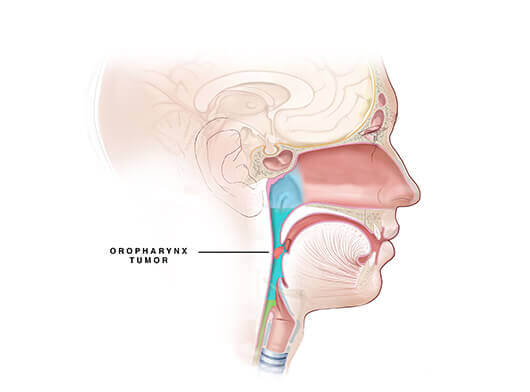The three main types of treatment for these cancers are surgery, radiation and chemotherapy. Most of these cancers will need surgery and /or radiotherapy. Chemotherapy is usually given when cancer has spread too far to be treated with surgery and radiotherapy.
- Surgery
- Radiation
- Medical Management
- Factors determining the surgical approach are the extent of the tumor and the structures involved. The main goal of the surgery is the complete removal of the tumor with negative margins, which means that there is no trace of cancer in the margin's healthy tissue. Some surgical procedures for the treatment of oropharyngeal cancers are:
- Tumor resection – The surgeon removes as much of the tumor as possible and other tissues where cancer may have spread, such as lymph nodes or neck structures.
- Mandibulotomy -The surgeon gains access to the tumor by splitting the lip and mandible (lower jaw). Surgery may affect how you eat, breathe or talk and hence reconstruction of the removed section might be necessary. Reconstructive surgery is done using the microvascular technique.
- Transoral CO2 laser resection - This approach involves using specialized transoral endoscopes with an operating microscope coupled to a CO2 laser.
- Transoral robotic surgery -In selective patients, robot-assisted minimally invasive surgery is performed. Transoral robotic surgery gives the surgeon an enhanced view of the tumor and the surrounding tissue. Using a da Vinci robotic surgical system, the surgeon guides surgical tools through the mouth to access the tumor and remove/ resect it. This technique provides the surgeon with increased precision and stability. TORS reduces morbidities associated with traditional open surgery, thereby reducing hospital stay and aiding in faster recovery.
- Transoral Ultrasonic Surgery (TOUS) - This technique is a surgical alternative to the Transoral Robotic Surgery. During a TOUS, the surgeon uses endoscopic tools through the mouth) to access the oropharyngeal tumor. TOUS reduces morbidities associated with traditional open surgery, thereby reducing hospital stay and aiding in faster recovery.
- Speech or Swallowing therapy - The doctor may recommend rehabilitation to improve speech and swallowing function post-surgery.
- Radiotherapy is most commonly used after surgery to kill cancer cells that are not visible during surgery.
- In some cases, when the tumor is extensive and a cure is not possible, radiation is given to ease symptoms like pain, bleeding and swallowing.
- Early-stage tumors can be treated with 3D conformal radiotherapy (3D CRT).
- External Beam Radiation Therapy - Locally advanced tumors are better treated with high precision irradiation techniques like IMRT (intensity-modulated radiotherapy), IGRT (image-guided radiotherapy), Rapid Arc or Proton beam therapy. These techniques can reduce side effects like xerostomia (dryness in the mouth) and difficulty in swallowing and result in a better quality of life.
- Chemotherapy
- Chemotherapy uses drugs to destroy cancer cells. The indication for chemotherapy is based on the stage of cancer and risk factors.
- Chemotherapy may be used before surgery to shrink large tumours, which makes it easier for tumor removal.
- Few patients may require chemotherapy after surgery which helps to kill any residual cancer cells. It is also indicated in cases when the disease has spread to other parts of the body.
- Chemotherapy also may be used in cancers where the tumor is inoperable. Sometimes chemotherapy is combined with radiation therapy.
-
Targeted drug therapy-
The indication for targeted therapy is based on molecular changes in the cancer cell. This is usually combined with chemotherapy and may be an option in selected cases. In the case of recurrent disease, based on the molecular alterations noted in the tumor, specific targeted therapy may be an option. - Immunotherapy Immunotherapy is a drug treatment that uses the immune system to fight cancer. For Oropharyngeal cancer, immunotherapy may be considered in a carefully selected group of patients where investigations show that immunotherapy may be beneficial.



.png)
